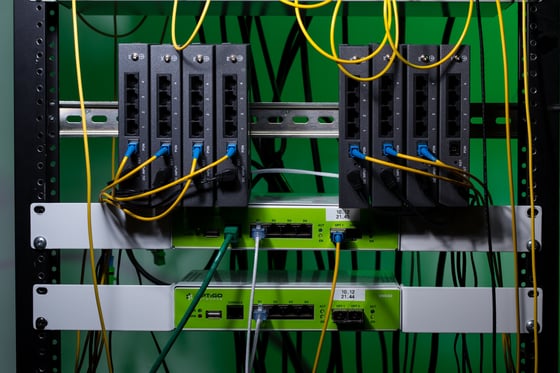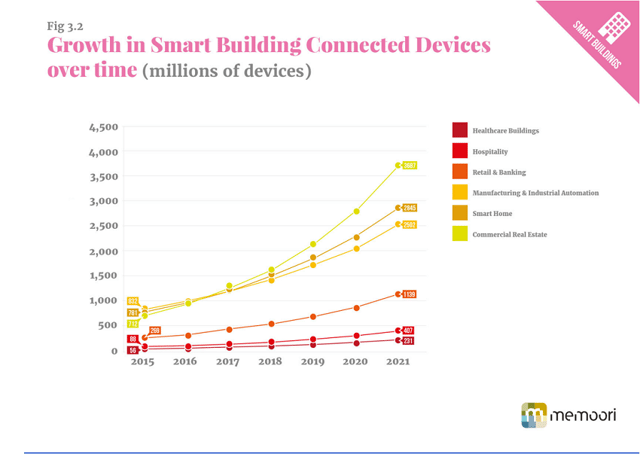.png?width=963&name=WordItOut-word-cloud-2608535%20(1).png)
The who, what, where, why, and how of Master Systems Integrators
The Master Systems Integrator (MSI) is not a new term by any stretch of the imagination. In fact, it’s been setting roots in the industry for years. As more IP-connected devices are installed in buildings every single day, though, the MSI has become much, much more than a buzzword.
If you haven’t already, it’s time to learn what an MSI is, what they can do for you, and how they will drive the smart building industry into the future.
Summary
- What’s an MSI?
- What’s the difference between an MSI and an SI?
- Why do you need an MSI?
- What’s a good MSI?
- Why is the industry moving towards MSIs?
- How do I become an MSI?
- How do I find an MSI?
What’s an MSI?
An MSI is, very simply, a deeply involved technology consultant:
- They ideally enter the equation at the design phase and consult every step of the way.
- They manage different parts of a building, across operational technology (OT) and IT.
- They should be knowledgeable on different integrated systems, manufacturers, designs, and industry best practices.
Shayne Taker, National Account Manager at Optigo Networks, describes an MSI as “someone that takes care of all building technologies, from security to building automation.” They’re completely hands-on, and could be involved in everything from “IP address schematics, to actually pulling the fiber, to supporting it after day one,” Taker says.
“If there’s a single point of contact for every building technology, I would consider that a true MSI.”
Not just anyone is going to be given this sort of authority, of course. It takes time, effort, and knowledge to build up that trust. The MSI has to seriously invest in their customer relationships.
As Joe Napieralski, Co-Founder and Director of Development of Smart Building Services LLC, says, “Understanding our customer’s operation, work flow, and existing challenges is the most critical part of our job. Taking the time to understand the conditions and jointly developing plans and strategies on how technology systems will address these issues is a key in the success of our projects.”
The MSI plays a hugely important role. They’re not just a contractor or an integrator. As Business Development Analyst at Hepta Systems Mike Reed puts it, an MSI is a partner.
“In terms of defining an MSI, I think it’s about a technology partnership role with an owner. As an MSI, you should look to help develop an intelligent building plan with the owner, even if you’re not necessarily going to be the one that picks up every PO in every project. You’ve got to have the trust of the owner to have a true mutually beneficial relationship.”
Your relationship with an MSI is not a one-time transaction. “It’s not about trying to do it all at once,” says Reed.
The MSI has a big picture, master plan view. They’re invested in seeing your building succeed, and they’ll help you plan for the future with a building that’s designed to adopt new technology. They won’t promise the moon and the stars, but they will help their clients build a realistic, forward-thinking roadmap.
What’s the difference between an MSI and an SI?
While there’s certainly space for both MSIs and SIs in the industry, the two are not the same. For Reed, the difference is largely in capacity. It’s about “having the right team to be able to deliver on the roadmap you’ve developed with an owner.”
Now, a lot of building automation and system integrators are starting to offer multiple services. They’re cropping up across lighting, HVAC, elevators, and more. But diversity of services alone does not make an MSI. System integrators — even ones that offer many different services — don’t integrate all the disparate components at all levels of a smart building. They do not build and deliver a client’s master plan.

A Master Systems Integrator, on the other hand, does. They take the building owner’s vision and execute it at all the system levels. This is a key difference between the MSI and the SI: the MSI will find solutions to their customer’s needs at any and every system level. The customer doesn’t even have to know the nuts and bolts of how their building works. They just have to know that it works.
Granted, the MSI might subcontract different pieces; but they have the knowledge to coordinate everything. As Brian Turner, President of OTI, says, “The MSI should offer a host of system-specific knowledge, with deep understanding of HVAC controls, lighting controls, or energy monitoring in any number of combinations. The most successful MSIs also have some IT expertise on staff to help with the design and implementation of the OT network.”
As the MSI grows, develops expertise, and adds more specialized staff, they can support even more projects on their own.
Since adding IT and software development departments to their company, for example, Hepta Systems has been able to say yes to more unique projects and requests. A prime example comes from a project Hepta did in Downtown Detroit a few years ago. The facilities team approached Hepta with an interesting request. They said that a particular tenant used the popular Nest thermostat at home, and absolutely loves the tool; would it be possible to have a Nest run their specific zone?
“A couple of years ago for us, we’d have to say, well we can’t do a Nest, but here’s a similar app with its own interface,” says Reed. “[Instead], we were able to turn to our in-house software development to write a connection to the Nest API. That tenant space now has an off-the-shelf Nest thermostat running a Johnson commercial VAV box.
“To the end-user, all they knows is, ‘I use the same app to change the temperature in my house before I leave in the morning as I do when I get to the office.’”
That is an MSI. They don’t have to have an in-house team capable of developing this sort of integration — of course they could subcontract the work out. The point is that they take their clients’ demands and they deliver.
Why do you need an MSI?
You’re in the design phase of a new building. Contractors and vendors are all coming at you with demands. Everyone has an opinion on how the control systems, electrical systems, mechanical systems, IT, software, and security should be integrated and managed. You have to coordinate these demands, and somehow end up with the best, most efficient building you can.
This all sounds like a headache, right? Well, a good MSI can help you navigate the ongoing challenges of managing and optimizing a smart building. They can offer expertise, long-term financial savings, and support for future-readiness.

Expertise
MSIs have in-depth knowledge of integrated building systems. As buildings become increasingly complex, that expertise is really important. There are more and more IP-connected devices being installed in commercial buildings every single day.
The benefits to this connectivity growth are massive. In the years to come, we can expect greater comfort, efficiency, and environmental friendliness out of our homes and offices.
IP connectivity isn’t always easy to manage, though. There are different vendors with competing interests; cybersecurity concerns; a technology landscape that is constantly evolving.
A Master Systems Integrator can shoulder all these burdens to help design an advanced, robust smart building network. The right MSI will roll with whatever you throw at them, whether it’s IT or OT, mechanical or electrical, hardware or software. They can design a complete systems, database, and user interface that works best for your building.
Financial savings
If your building systems are designed, integrated, and managed properly, you can see tremendous financial savings through future readiness, reduced maintenance and repair costs, energy savings, and even higher operational efficiency.
Right now, buildings consume a lot of energy. The building sector is responsible for more than one-third of final energy consumption, according to the International Energy Agency. Commercial buildings alone could save $60 Billion if energy efficiency efforts were increased by only 1–4%, based on reports from the American Council for an Energy-Efficient Economy (Buildings magazine).
It’s not enough to plug your devices in and be successful on day one, though. If those devices aren’t integrated and managed correctly, they won’t do much (if anything) to solve your energy woes. The right MSI partner can take a building owner’s goal of reducing energy use and make it a reality on an ongoing basis. With analytics, management interfaces, and devices that are properly configured, you’ll end up with a healthy, energy-efficient system.
Future-readiness
The real estate industry is facing a big challenge right now: the rapid acceleration of technology. These new innovations are of course fantastic and come with many different benefits. Retrofitting old buildings that aren’t constructed for new-fangled gadgets and gizmos can be a huge task, though.
One up-and-coming element of future-readiness is Power over Ethernet (PoE). As Taker says, “I think the future of buildings is PoE.” Security cameras are predominantly running on PoE, but we’re starting to see HVAC, VAVs, access control, and even lighting running on PoE. “The more that these building technologies evolve, the more likely they are to convert to Power over Ethernet.”
We must make older buildings more adaptable, and construct new buildings that are ready for the unknown future. Your relationship with an MSI is an ongoing partnership. They’ll prepare you and your building for the fast-growing future of IP connectivity.
Know that you need an MSI? We’ve got you covered: check out our ultimate guide to finding an MSI and questions you should be asking any potential MSI.
Now, what’s a good MSI?
First and foremost, a good MSI should understand the client's intent and deliver on their expectations. The client’s needs always come first.

In any choices the MSI makes, they should focus on building the best long-term strategies, as well. That means using open technologies. “Laying out a strategy that’s not going to leave anybody with one vendor-locked option is crucial,” says Reed.
Reed and Jason Houck, Chief Information Officer at Hepta, emphasize the importance of looking forward: “A seasoned MSI can help develop a roadmap for where a building is, where it could be, and how to bridge that gap.”
Taker agrees that it’s all about that forward-thinking vision. “For me, a good MSI is always looking to future-proof. So, having available strands, having available ports, not just looking for day one and having a small, maxed-out port count. They’re looking to have maybe six or seven extra ports; maybe even a switch per floor; redundancy. They’re not looking for the best bottom-line on the first day, but looking for sustainability.”
In some cases, a good MSI should also act as something of an educator or guide. There’s a lot of conflicting, confusing information out there. The MSI should help clients navigate the clutter and roar of the smart building industry. “As different terms become buzzwords, it gets really important to make sure the customer understands what they really mean,” says Reed.
“Everybody knows they want to have that smart building, but they may not know how to start. They may think there’s a one-size fits all strategy to get to that smart building. With an MSI, [...] you have a partner to work together, to identify how to start, and where to go.”
To help you find the best MSI to meet your needs, we have a checklist of questions you should ask any MSI. Hopefully this will help guide your initial conversations with potential MSIs.
Why is the industry moving towards MSIs?
So, why is the MSI growing in prominence? Well, there are lots of different reasons, including a critical mass of IP-enabled devices, software-driven technology, and big data and analytics.
Reaching critical mass: The connected building
There’s an abundance of IP-connected devices in our buildings. From lighting, to heating, printers, cameras, and everything in between; our buildings have never been smarter, more connected, or more alive than they are today. This creates a demand for people who can coordinate and manage all these different systems.
Jim Whalen, SVP Chief Information Officer at Boston Properties, says “there’s a greater awareness for the need to manage systems for economies of scale, for monitoring, for integrations and for security across the industry. There’s still a prevalent old-school bias and practice to just bidding each system and separately managing connectivity and cabling requirements for each siloed system.
"But there are changing norms with a now critical mass of successful projects that have taken a more integrated approach to how your systems have to be wired, connected, monitored, secured and increasingly talk to one another.”
Increasing software sophistication
Facility technology is also being driven by ever more sophisticated software. Software advances are enabling capabilities in how facilities are more ‘smartly’ managed and how occupants engage and experience their space. With the cloud and mobile as additional enablers, the objective is to incorporate new technologies and innovations that improve the comfort, occupant experience and efficiency of buildings.
As Whalen says, “Software is driving with greater sophistication and maturity how your building operates. You are seeing a layering of new or advancing technologies that are pushing the number of endpoints that are IP-addressable. This IP enablement is across all systems and platforms from HVAC, lighting, access control, WiFi/distributed antenna systems and energy management with the increasing use of sensors.”
"The network connectivity that is required in today’s building is a different reference point than it was five years ago, or 10 years ago, or 15 years ago. The connectivity requirements are greater as IoT penetrates physical real estate and represents a significant underlying trend that we’re dealing with as an industry.”
Big data: From “what” to “so what?” — to “now what?”
We’re also seeing big data and analytics being leveraged to better understand our buildings. Devices are being built to collect information, so that we can make more informed decisions in management. An MSI can help clients understand what data to collect, gather insights, and improve their systems.
Reed explains that five or 10 years ago, the industry was focused on collecting big data and information. That was the “what” phase. Then the industry moved to the “so what” phase, of understanding what this data means in the grander scheme. Now we’ve shifted into the “now what” stage, where industry leaders are putting analytics to use and evolving with our data.
“Everybody wants to be collecting ‘big data,’ but the key is knowing what you’re going to do with it. You go from big data to actionable insight, but eventually you’ve got to take that action.”
How do I become an MSI?
Are you looking to become an MSI? Here are a few quick tips to keep in mind:
- Don’t expect to become an MSI overnight. This sort of change takes time. Expect a long-term evolution, and look for opportunities to grow.
- Consult with your customers. Being an MSI is all about partnerships and relationship building, so it’s important to understand how you can better serve your current clients.
- Pay attention to the industry. What are the current trends and buzzwords? Which of those has staying power?
One of the biggest mistakes you see companies make in trying to become an MSI, Reed says, is taking on more than the company can handle. It’s better to expand slowly and organically than to rush rapid growth.
“You may see cases where you’re trying to bite off more than you can chew. ‘We have to add IT, we have to add software development' — trying to do everything all at once.”
Remember, Hepta expanded over the course of years, decades even, so don’t expect to be a Master Systems Integrator overnight. “We’ve evolved pretty naturally with our client base. [...] We’ve expanded our company as we’ve seen opportunity and just chosen to act on it,” says Reed. Slow and steady might be a trope, but there’s a reason it works.
How do I find an MSI?

The best advice we can give you in finding the right MSI is to seek out a partnership. You want an MSI who’s invested in helping you — not someone who sees you as the next big paycheque.
Now, where do you find that good MSI? There are plenty of resources out there to help you. We’ve got a few must-read resources, with our list of MSIs organized by name and geography and a checklist of questions you should be asking any MSI.
Definitely look to the industry, as well. Tap into Realcomm and IBcon, ControlTrends and Automated Buildings. These are fantastic resources to understand your goals, your needs, your expectations, and what an MSI can deliver. From there, you can start having those conversations and forming those relationships.
“Owners should look to build those relationships to make sure you’re not getting involved in a situation where somebody just sees you as a dollar sign," says Reed. "You really want to have a relationship where your MSI is as proud of your building as you are.”
Don’t be afraid to start approaching MSIs. Even if you don’t have all your goals and expectations laid out, you don’t need a master plan to start talking with Master Systems Integrators.
“Don’t be afraid to start a conversation if you don’t know exactly what you want, or even why you want it. That’s what we as an MSI are here for. You don’t see a lot of people out there who know exactly what they want if they haven’t had those conversations already,” Reed says.
The sooner you start learning and having those conversations, though, the better. “You’ve really got to spend some time and educate yourself. And really have an idea of what the end in mind is. If you know where you’re trying to go, it’s a lot easier to map out your path there. If you’ve never defined where you’re trying to get, you will never get there,” says Brian Turner. “There’s nothing more true of that than today, because [...] you have a lot of technology here available to you. [...] If you don’t know where you’re going, you’ll just end up with a building full of technology that got you nowhere.”
If you want to integrate systems, plan for the future, or see long-term financial savings, start having those conversations. The farther forward you begin to think now, the better off you’ll be in one year, five years, or 10 years.
Ready to find the right MSI for you? Here’s our ultimate list of Master Systems Integrators organized by name and geography, and a checklist resource to help guide your initial conversations.


